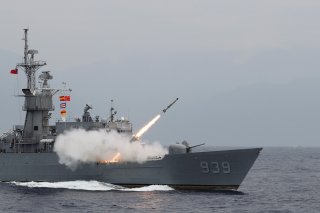Taiwan Will Fight China in a War For Its Freedom
Taiwan can hold out, given it has the both the political will and military means to fight for its freedom.
Yes, Taiwan will fight
Donald Trump was never pro-Taiwan. What I mean by that is that he never saw the nation as an asset in our struggle with China.
Some believe that Taiwan is a liability for America. They fear that China will inevitably swallow the democratic island of 24 million people by force, and that while the United States should try to deter such a calamity, there is no need to risk World War III by fighting the Chinese over an island in their backyard.
The pro-Taiwan camp differs. It holds that Taiwan puts the lie to the entire reason for existence of the Chinese Community Party (CCP). The CCP says the Chinese people need the iron fist of the Party to stave off the chaos and the humiliation at the hands of foreigners that marked China’s chaotic modern history. In Taiwan, ethnically Chinese people live in freedom, govern themselves democratically, and have the rule of law. They’re also better off economically: according to the Central Intelligence Agency, Taiwan has a per capita income of $24,502, compared to $16,117 for China.
To put it another way, the pro-Taiwan crowd sees the country as an invaluable political warfare tool in the Free World’s struggle with Beijing. Knowledge of Taiwan’s success is one of several factors eroding support for the CCP, and the CCP knows it.
But Trump didn’t. To his credit, he eventually had some political appointees beneath him who were very pro-Taiwan. This feature may have been unintentional, given Trump’s galactic incompetence with personnel—an eighth wonder of the world. But it worked out for Taiwan. Trump’s secretary of state, Mike Pompeo, gave strong verbal support to Taiwan, approved several arms packages for the country, including new F-16 fighters, and sent his under secretary to visit the nation. He also dropped pointless and insulting curbs on diplomatic engagement with Taiwan that had often led U.S. and Taiwanese officials to meet in coffee shops. Pompeo was also tougher on China than any secretary of state since John Foster Dulles, if not ever. Pompeo heralded an end to “blind engagement” of Beijing and condemned China’s military aggression and human rights abuses.
But the rub for Trump was a belief that Taiwan wouldn’t fight in a war, at least not for long. An interesting feature of Washington’s feckless national security establishment has been a stark shift in views on China, from a belief that its threat to Taiwan was overblown to an assumption that it will eventually conquer the island. In part because of a lack of communication between top levels of both nations’ militaries (in contravention of law), and thanks to decades of pre-Trump neglect of getting adequate U.S.-made arms to Taiwan, there is a view that the country would fold rapidly in a conflict with China. If we wake up one Sunday to learn that China has plastered Taiwan with hundreds of conventional missiles, with paratroopers presumably on the way, and the Chinese navy dominating the Taiwan Strait, will the Taiwanese even hold out long enough for Washington to marshal its too-few ships and aircraft in the Pacific for a fight?
I think they will.
First, there is the political angle. While the Free World lost Hong Kong to the CCP, its people, who struggle on through more subdued means, did not lose their freedom in vain. Supposedly concerned only about money, the people of Hong Kong, through protest and resistance, showed that free ethnically Chinese people will not surrender their freedom without a fight. While this now seems obvious, it was in doubt before Hong Kong’s Umbrella Movement in 2014 and much broader protests of 2019 and 2020. This sentiment was echoed on Taiwan, where the tough-on-Beijing ruling party and president achieved resounding success in 2020 elections and relegated to a fringe the old voices that still entertained union with China under the CCP.
Then there is the military angle. Under Trump, officials at the State Department, National Security Council, and Pentagon accelerated quick, simpler arms sales to Taipei, which in turn increased its defense spending. They set aside costly options like the F-35 fighter, and instead moved pragmatic aircraft and other weapons like tanks, drones, missiles, and missile-defense systems to the country—all paid for by Taiwan. Just this week, the Biden administration continued the trend by notifying Congress it intended to export M109 self-propelled howitzers to Taiwan. The country is developing its own electric submarine, which could help the U.S. Navy and Air Force sink a Chinese invasion force.
Taiwan can hold out, given it has the both the political will and military means to fight for its freedom. Beijing likely suspects this, and should understand that the risks it would face in attacking Taiwan are too great, especially since failure would destabilize the Chinese government.
Washington could make the world a safer place by acknowledging this reality as well, and dispensing with the defeatist, pessimistic view of Taiwan. Furthermore, it is negligent that our two militaries do not drill together and have a unified military command, ideally with Japan involved as well. By taking these steps, Taiwan can be an even greater asset in our deterrence of China and struggle against CCP aggression.
Christian Whiton, a senior fellow at the Center for the National Interest, is the author of Smart Power: Between Diplomacy and War. He was a State Department senior advisor during the George W. Bush and Trump administrations.
Image: Reuters.

